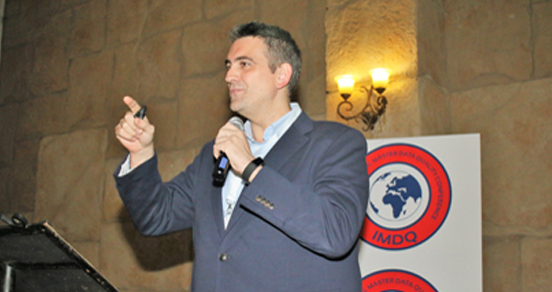In September 2017, the annual international conference (IMDQ) on data quality took place in Centurion, South Africa. This has become the annual meeting of some of the worlds foremost authorities on data quality and developing trends in data quality management in businesses. They also explore related topics and prospects that open new approaches, technologies and methodologies that can be successfully applied by businesses around the world.
PiLog, being one of the leaders in the market for data quality management solutions, highly appreciates the opportunity to meet colleagues from different countries and exchange experiences and opinions. This is why Pilog gladly supports this conference and actively participates in the discussions and showcase Pilog's latest field experience.

- Dr Ismael Caballero presenting IMDQ 2017
Data is gradually becoming an independent information product and requires the same product management approach to become one of the company's key assets. Within the framework of the working sessions, the views of the scientific community on the construction and evaluation of the management system were presented, as well as the experience of companies on the practical application of the principles of improving the quality of data in various business sectors.
In a 2015 survey, Aberdeen Group estimates that 47% of the data is considered by companies to be unreliable, and 54% of analytical conclusions are based on insufficient data. Poor data quality consumes 20% of labor productivity and causes 40% of business initiatives to fail. Nevertheless, one cannot abstractly assess the quality of a particular data set - the very concept of data quality does not exist in isolation from those business requirements that must be met. Professor John R. Talbort from the University of Arkansas Little Rock (USA), devoted his presentation at the conference to the ways of assessing the quality of data, the principles that should form the basis of the data management system, as well as the discussion of the new role that has recently appeared in the companies that of the Chief Data Officer.
"What you sow is what you reap this saying typifies the dependence of the final result that is obtained from the companies original data. The IT analogue of this saying is the principle of GIGO (Garbage in - Garbage out), which declares the poor quality results that are obtained from the processing of poor-quality data. This principle should be remembered when implementing the now fashionable Data Lake concept in practice, which involves the collection and storage in a single place of large data sets from various external and internal sources for further analysis and use. In his presentation, Professor John Talburt emphasized that companies need to make special efforts to ensure that the lake does not become a data swamp. Professor Ismael Caballero, from the University of Castilla-La Mancha (Spain), continued this topic in his presentation, focusing on models for assessing organizational maturity and data quality. Such models are a necessary key to understanding how to avoid meaningless "bogs" of data in the data lake and in ERP systems. The results can be disastrous, leading to huge amounts of money being spent without any real benefit. On the contrary, such bad data mostly leads to actual losses.
Given that data is increasingly acknowledged as being a separate valuable asset of the company, the costs of creating and maintaining a management system for this asset are naturally classified as investments. A large discussion was devoted to the parameters on the basis of which it is possible to calculate the ROI for data management projects.
Attention to data is growing not only at the level of companies, but also at the state level. The challenges and opportunities arising in the process of building spatial data infrastructure (SDI) in different countries of the world, as well as the impact of restrictions imposed by legislation on the protection of personal information, and the consequences of errors in macroeconomic data were discussed. Navigation systems have made us more and more dependant on quality GIS data, but the application of GIS data goes far beyond navigation.
As always, software solution presentations were popular. Both SAP and PiLog presented on the implementation of Master Data Governance systems, in particular SAP-MDG. These presentations drew a lot of attention, questions and follow up discussions.
We believe that many of the ideas discussed at the conference deserve the broad attention of specialists, so we are going to share them in the following publications, giving the floor to the experts. We hope that you will be able to learn new ideas for yourself and apply them in practice.
If you need our help in developing and implementing a data quality project, and the decisive tasks that are relevant for your business contact a PiLog office.